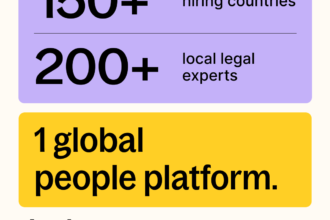Hiring employees across borders is an exciting step toward global expansion, but it comes with complex legal, tax, and compliance obligations. Employers must understand local labor laws, payroll requirements, and worker classification rules to avoid penalties and ensure smooth operations.
This blog will break down key employer responsibilities when hiring internationally and how to stay compliant.
1. Establishing the Right Employment Structure
Before hiring abroad, companies must decide how they want to employ workers:
✔ Set Up a Legal Entity – Establishing a local subsidiary is required in some countries but can be expensive and time-consuming.
✔ Hire Through an Employer of Record (EOR) – An EOR partner manages employment contracts, payroll, and compliance without needing a local entity.
✔ Work with Contractors – Independent contractors provide flexibility, but misclassification risks exist if labor laws are not followed.
Key Considerations:
- Some countries require permanent establishment (PE) registration for tax compliance.
- Misclassifying workers can lead to fines, back taxes, and legal disputes.
2. Complying with Local Employment Laws
Every country has unique labor laws that employers must follow, including:
✔ Minimum Wage Regulations – Wages must meet or exceed local standards.
✔ Working Hours & Overtime – Countries like France have strict 35-hour workweek limits, while others allow more flexibility.
✔ Mandatory Benefits – Health insurance, retirement contributions, and paid leave vary by country.
✔ Termination & Severance Rules – Dismissal procedures differ; some require notice periods and severance pay.
Example:
🔹 In Germany, employees must receive at least 20 days of paid vacation annually under labor laws.
3. Payroll & Tax Compliance
Employers must handle payroll taxes, social security contributions, and income tax withholdings for international employees.
✔ Tax Withholding – Employers must deduct and file income tax per local tax regulations.
✔ Social Security Contributions – Countries like the UK and Canada require contributions to national pension and healthcare systems.
✔ Payroll Reporting – Many governments require monthly or quarterly filings for payroll data.
Common Challenges:
- Varying tax rates across jurisdictions.
- Double taxation risks if employees work in multiple countries.
- Changing compliance laws, requiring frequent updates to payroll systems.
4. Work Permits & Visa Requirements
For foreign employees, employers must secure work visas and residence permits before hiring.
✔ Verify Work Eligibility – Some countries have quotas or restrictions on foreign workers.
✔ Sponsorship Obligations – Employers may need to sponsor visas and cover legal fees.
✔ Permanent Residency Options – Long-term foreign employees may qualify for PR or citizenship.
Example:
🔹 The H-1B visa in the U.S. allows skilled workers to work for an employer, but sponsorship is required.
5. Data Protection & Employee Rights
Countries have strict regulations on how employee data is stored and used. Employers must comply with:
✔ GDPR (EU) – Protects employee data privacy; violations can lead to hefty fines.
✔ HIPAA (U.S.) – Covers health-related employee data.
✔ Local Employment Contracts – Must specify work conditions, salary, and benefits in writing.
6. Choosing the Right Hiring Strategy
To ensure smooth cross-border hiring, businesses can:
✅ Use an EOR or Global Payroll Provider – Handles compliance and payroll for international employees.
✅ Consult Local Legal Experts – Ensures adherence to labor laws, visa rules, and tax regulations.
✅ Invest in HR Tech Solutions – Automates payroll processing, tax filings, and compliance tracking.
Conclusion
Understanding and meeting employer obligations in cross-border hiring is essential for maintaining compliance, avoiding legal risks, and ensuring a smooth expansion process. By choosing the right hiring model, complying with local laws, and using professional payroll services, businesses can build a strong international workforce while staying compliant.






